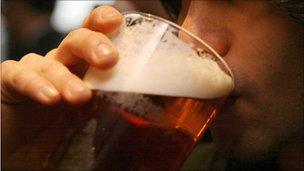Nightclubs to be rated on number of violent and drunken incidents
- Published

Plans are being developed to introduce a new traffic light rating system for nightclubs.
The PSNI is developing a 'traffic light' system to tackle alcohol-related crime and violence at bars and nightclubs in Belfast, the BBC has learned.
Under the system, bars and clubs would be given a red, amber or green rating depending on how many violent incidents they are linked with.
Bars with a persistent red rating could face penalties or licence restrictions. The scheme, which is in the early stages of development, was first introduced into the UK in Cardiff.
The Welsh city has the highest saturation rate of people per square metre of any night-time economy in the UK.
On a typical weekend, more than 40,000 people enjoy a night-out in the Cardiff's bars and clubs, but this can rise to more than 100,000 people after a big sporting event.
Key features of the 'traffic light' scheme in Cardiff, which is the model the PSNI are working from, include grading the premises on their size and then giving them points for incidents which are linked to them.
Data about incidents at licensed premises is collected and shared by South Wales Police and A&E staff at University Hospital of Wales.
Points are allocated to the city's bars and clubs on the number of alcohol-related crime and disorder incidents, including assaults, evidence of selling alcohol to under 18s, and incidents involving door staff.
The number of points given is based on the seriousness of the crime.
A serious assault is worth five points; an assault three points; affray two points and other alcohol related crime results in one point.
The results are then added up and the premises will be given a green, amber or red rating.
A green rating means the police have no concerns, while an amber rating means that the bar or club will be more closely monitored.
Closing time
If a premises moves into the red zone then a licensing officer agrees an action plan with the bar to tackle the problem and police pay visit the premises every Friday and Saturday night.
If there is no improvement then the premises' license may be affected.
Evaluations have shown that the scheme in Cardiff has been very successful.
The 'traffic light' scheme won a Home Office Award in 2009.
At that time, an analysis of 16 bars and clubs which had received a 'red' rating showed that incidents of alcohol related crime and disorder decreased by 35% on average following intervention by the police.
In a statement the PSNI said that the 'traffic light' scheme "was instrumental in helping Cardiff City Council to improve the management and safety of the night time economy."
"The PSNI is currently in the process of consulting with a range of stakeholders in relation to the model."
The PSNI has already made presentations to representatives from Pubs of Ulster and to a partnership group, led by the Belfast Health and Social Services Trust who are looking at sharing data from A&Es here.
The PSNI has also asked to brief the licensing committee of Belfast City Council on the scheme.
A voluntary 02:00 BST closing time is already in existence in Belfast, although some premises have now left that agreement.
- Published18 May 2012
- Published30 April 2012
- Published23 April 2012
- Published7 March 2012
- Published2 March 2012
- Published7 March 2011